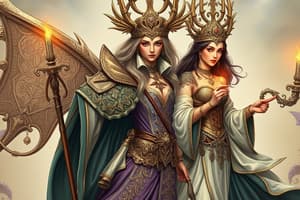Podcast
Questions and Answers
What is the main purpose of character classes in role-playing games?
What is the main purpose of character classes in role-playing games?
- To control the player's movement in the game world
- To provide a distinct set of traits and capabilities to each character (correct)
- To determine the physical appearance of the character
- To give players special abilities to use in combat
Which class is characterized by its strength and ferocity in many role-playing games?
Which class is characterized by its strength and ferocity in many role-playing games?
- Rogue
- Cleric
- Barbarian (correct)
- Wizard
What type of abilities might a Barbarian class have?
What type of abilities might a Barbarian class have?
- Magical spells and enchantments
- Stealth and thievery skills
- Rage mechanics and battle cries (correct)
- Healing powers and support abilities
What is a common trait of Rogue class characters?
What is a common trait of Rogue class characters?
How do character classes help players during gameplay?
How do character classes help players during gameplay?
Which aspect of gameplay do character classes NOT influence?
Which aspect of gameplay do character classes NOT influence?
What is a key characteristic of the Sorcerer class?
What is a key characteristic of the Sorcerer class?
Why do Sorcerers need to stay out of harm's way?
Why do Sorcerers need to stay out of harm's way?
What should players consider when selecting a character class?
What should players consider when selecting a character class?
Which factor might influence an experienced player's choice of character class?
Which factor might influence an experienced player's choice of character class?
How do character classes contribute to role-playing games?
How do character classes contribute to role-playing games?
Why is it important for players to understand different classes' strengths and weaknesses?
Why is it important for players to understand different classes' strengths and weaknesses?
Flashcards are hidden until you start studying
Study Notes
Character Classes
In many role-playing games, players create characters with various attributes, skills, and abilities. These characteristics can be divided into different classes, each representing a distinct set of traits and capabilities. This concept is present in tabletop RPGs like Dungeons & Dragons and video games such as World of Warcraft. In this article, we will explore character classes and their significance within these gaming communities.
Character classes serve several purposes. They help define the roles that each player's character will play in the game world. For example, some classes might specialize in combat, while others focus on healing, support, or gathering information. By having clear roles and responsibilities associated with each class, players can better understand how they fit into the larger narrative and cooperate more effectively during gameplay.
Types of Character Classes
There are numerous character classes across different games and systems. Here are three examples from classic role-playing games:
-
Barbarian: A warrior class known for its strength and ferocity. Barbarians often have high health points and deal significant damage when wielding weapons. Their abilities may include rage mechanics, where taking damage increases their attack power, or using battle cries to inspire their allies.
-
Rogue: A stealthy class skilled in thievery and trickery. Rogues often excel at bypassing obstacles, picking locks, and disabling traps. Some rogue classes also maintain a balance between dealing damage and providing utility through features like poison, trapfinding, or lockpicking.
-
Sorcerer: A magical class characterized by spellcasting and elemental manipulation. Sorcerers rely on powerful spells they learn over time, including offensive magic for attacking enemies and defensive magic for protecting themselves. They typically have lower hit points and armor compared to other classes, so they need to stay out of harm's way to survive.
These examples highlight diverse approaches to character creation; choosing a specific class will depend on personal preferences and how one wants their character to contribute to the game experience.
Choosing a Character Class
Selecting a character class involves considering factors such as preferred playstyle, desired contributions to the group, and potential synergies with other classes. Experienced players may prefer classes with which they feel most comfortable, based on previous experiences playing those classes. On the other hand, newer players might choose a class they find visually appealing or simply enjoy the sound of its name.
Character classes provide structure and variety within role-playing games. By understanding the strengths, weaknesses, and typical behaviors of different classes, players can create well-rounded teams capable of handling various challenges encountered during gameplay. Additionally, this knowledge allows players to adapt strategies based on circumstances, ensuring engaging and dynamic encounters throughout the game.
Studying That Suits You
Use AI to generate personalized quizzes and flashcards to suit your learning preferences.




